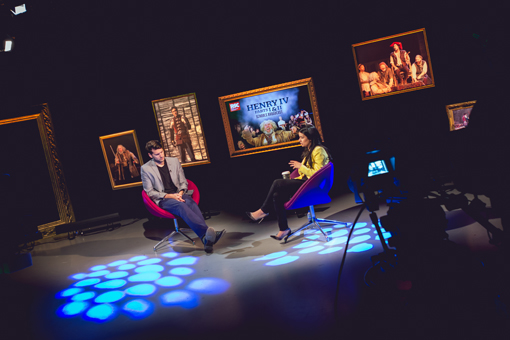Opening the Window on Shakespeare’s Biggest Classroom
Taryn Storey looks behind the scenes of a digital collaboration between the Royal Shakespeare Company (RSC) and Ravensbourne College.
About the Author: Dr Taryn Storey was appointed Higher Education Programme Developer at the Royal Shakespeare Company in July 2015. She has recently completed an AHRC funded PhD at University of Reading on New Writing Development in Post-War British Theatre, and has taught Drama at the Universities of Worcester, Reading, Bedford and Oxford Brookes University. She has previously worked as an Education Associate Practitioner at the RSC, as Youth Arts Co-ordinator at Pegasus Theatre in Oxford, and as Creative Director of a major project at the Theatre Museum (Victoria and Albert Museum) in London.

© Jamie Morris / Ravensbourne College
It is 9.00am on the 15th November 2013. As 31,000 school children throw down their bags and take their seats in classrooms across Britain, actor David Tennant, and the RSC’s Artistic Director Gregory Doran, are being rushed from Stratford Upon Avon to a TV studio in South London. Waiting to greet them is TV presenter Konnie Huq. They are about to embark on a unique educational journey: an interactive live streaming of the Royal Shakespeare Company’s production of Shakespeare’s Richard II. At 9.15am the broadcast goes live. It is the first time 87% of the children watching will have seen an RSC production, and the first time 57% of them will have seen a Shakespeare play.[i] But this is to be far from a simple screening of the production: it is an opportunity for school students across the UK to interact with the director and lead actor in real time. Welcome to Shakespeare’s biggest classroom.
The RSC’s free Schools’ Broadcasts began in 2012 as part of the aspirations of the theatre company to use digital technology to increase their audience reach, and to create exciting and innovative approaches to young people’s first encounters with Shakespeare. The Broadcasts have developed through a unique collaboration between the RSC’s Education Department and students of Ravensbourne College in London, and provide an example of how the arts and cultural sector can work directly with Universities in the development of technological and pedagogic innovation.
Increasing the links between the academic community and the creative industries has been the subject of two recent reports by Universities UK (2014) and the Arts and Humanities Research Council (2015). These reports argue that collaboration is crucial in terms of training graduates entering the workplace – providing ‘a valuable tool for building higher level skills’[ii] and enabling the development of ‘creative human capital’ [iii] However, the RSC/Ravensbourne collaboration is not just a training ground for future workers within an industry, it has delivered bespoke technology that has developed the way in which the RSC engages with its audiences and provides meaningful connections with young people, and has developed the pedagogy of both partner organisations. As such, it is an excellent example of a meeting point between the HE sector and the Cultural sector that creates what Comunian & Gilmore describe as a ‘third space’[iv] which offers ‘more organic models of engagement where knowledge can be co-created and developed across and beyond academia.’ [v] It is also an example of how investment in innovative technology within the arts sector can open the doors to new audiences.
…an example of how investment in innovative technology within the arts sector can open the doors to new audiences.
The collaboration between the Royal Shakespeare Company and students from Ravensbourne College was originally initiated in late 2011 as a legacy project for the 2012 Cultural Olympiad. RSC Education commissioned theatre-maker Tim Crouch to create a new play for young people (I, Cinna, The Poet) based on the story of the poet in Julius Caesar. This was to accompany Gregory Doran’s production of Julius Caesar for the RSC’s main stage.
‘The RSC, Cisco and Ravensbourne wanted to find a way of streaming the production online in a way that felt as close as possible to a theatrical experience. We knew we didn’t want to produce a downloadable film. We wanted to create a real time event online that enabled all participants to be part of the same experience, just as a theatre audience are. The original concept was to film the performance live from the Swan theatre, but we didn’t have the capacity in our schedules to make this possible. So instead, Ravensbourne put together an outside broadcast team and we filmed I, Cinna on location in London. Another group of students then created the platform that the film would be streamed through and a third group of students ran the live studio element.’[vi]

 Learning on Screen
Learning on Screen